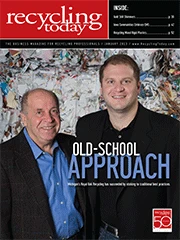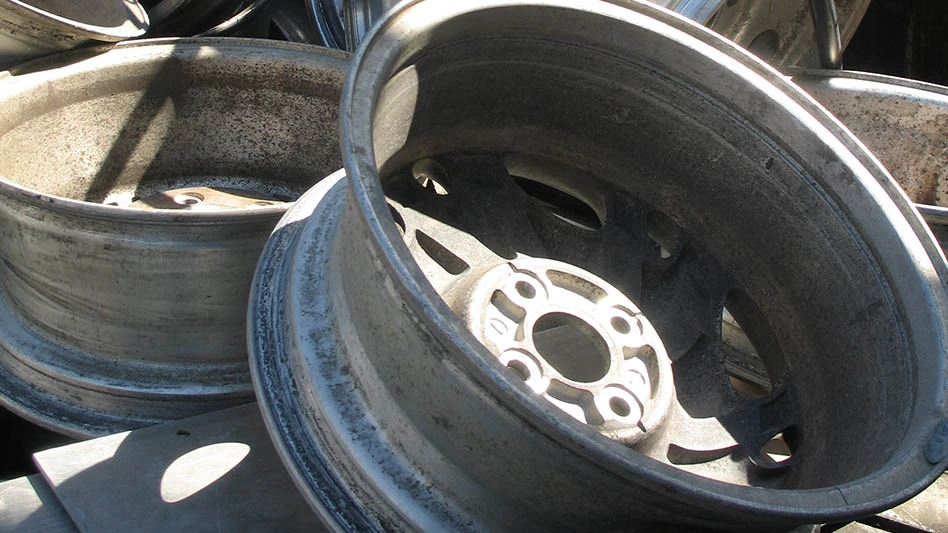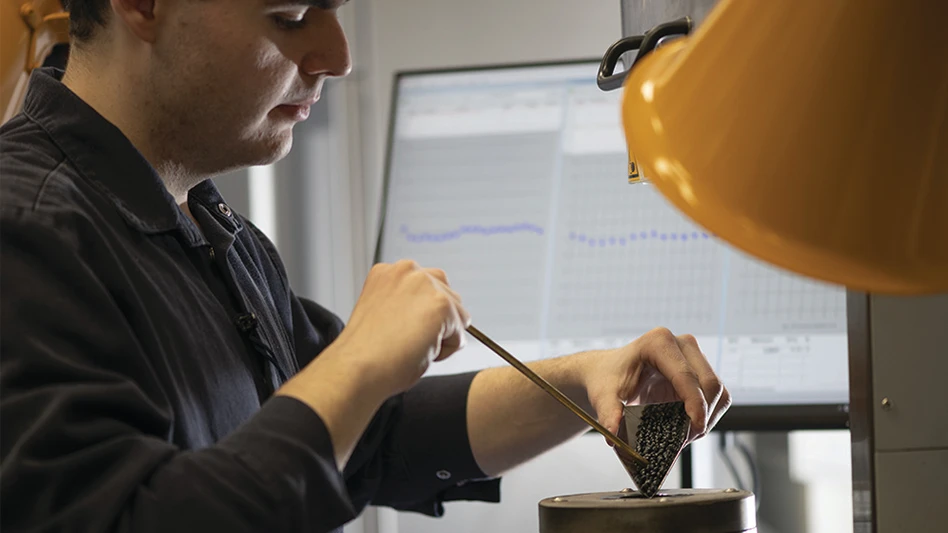 When Ed Mamou, vice president of Royal Oak Recycling, a Royal Oak, Mich.-based recycling firm, is asked what his company’s motto is, he is quick to say, “underpromise and overperform.”
When Ed Mamou, vice president of Royal Oak Recycling, a Royal Oak, Mich.-based recycling firm, is asked what his company’s motto is, he is quick to say, “underpromise and overperform.”
This philosophy has been the cornerstone of Royal Oak Recycling’s business throughout its 20-year history.
Royal Oak Recycling, under the ownership of Ed’s father, Habib, reflects its founder’s hard work and philosophy of developing partnerships with customers. As a result, the company has grown from a small paper stock plant into a diversified, multistate operation.
From the Ground Floor to the Top Floor
The story of Habib’s entrance into the recycling industry is familiar and yet unique. Habib immigrated to the United States from Iraq in 1973 after leaving the Catholic priesthood, where he served for eight years. Uncertain about what to do in the United States, he started taking classes at a local university.
While attending college, he worked sweeping floors at Great Lakes Recycling, a Roseville, Mich., recycling firm. He was named a vice president of the company in 1983, propelled by his ambition and determination.
Sandy Rosen of Great Lakes Recycling fondly remembers working with Habib. “At the time he left, I tried to keep him,” Rosen says. “I told him we could do great things together. However, he is such a shrewd, hard-working guy, I knew he had to go on his own. He just has that drive to create his own empire.”
Habib ultimately purchased a small paper stock plant named Royal Oak Waste Paper & Metal in 1992. While the company was established in 1935, it was bumping along, “handling a little bit of office paper, cardboard and some metal,” Habib says.
Habib, who has worked in the recycling industry for 39 years, saw great opportunities ahead for his new company. He says pursuing the American Dream means always being on the lookout for ways to grow his business.
Not content with the small 10,000-square-foot warehouse and its modest processing capability, Habib, with the assistance of a Small Business Administration loan of $900,000, purchased a high-volume shredder and baler combination from Enterprise Co., Santa Ana, Calif.
Soon after, Royal Oak Recycling acquired land surrounding its original location with further expansion in mind. In 1998 the company applied for a $4.4 million low-interest Industrial Revenue Bond loan, which allowed it to add a second baler, increase its warehouse space, pave the surrounding property and add a railroad spur.
In 2005, with the company starting to take off, Habib realized he needed more help. That’s when he called on his son Ed, who came aboard as a vice president.
Far from a novice, Ed says he grew up in the recycling industry. He has used much of his college education, which includes a masters degree in applied mathematics, to not only strengthen the company’s day-to-day business but also to help Royal Oak Recycling to position itself for the future.
Changing the Model
In light of the slowdown in generation of paper, especially from printers, the company has aggressively pursued corporate clients to maintain and grow the volume of material it processes. Royal Oak also has expanded the recyclables it handles, notably adding plastics. In 2007, reflecting its growth into other commodities, the company changed its name to Royal Oak Recycling.
|
Royal Oak Recycling at a Glance Officers: President Habib Mamou and Vice President Ed Mamou (pictured at top, from left) Location: Headquartered in Royal Oak, Mich., with additional facilities in White Lake, Mich., Cleveland and Pittsburgh No. of Employees: More than 100 Equipment: Commercial-grade balers and high-capacity shredders, supplied by Enterprise Co., Santa Ana, Calif., capable of processing 40 to 50 tons per hour are at each site. Several sites have guillotines for book cutting, roll splitters and roll cutters. Services Provided: Collection, sorting, drop-off recycling, semi load, roll-off, brokerage/recycling marketing, bale route pickup, office recycling programs, secure shredding and product destruction, recycling system installation and maintenance and waste flow consulting. |
“We are expanding and adding plastic separation equipment, which will upgrade and increase our plastic stream,” Ed says. “We are looking to add 100,000 square feet of warehouse space in Metro Detroit to process the volume that is already there. We are also working with local waste haulers, conducting trash audits to right-size and right-service their accounts,” he adds.
Along with expanding the focus of the materials it handles, Royal Oak also has broadened its geographic coverage. The company has opened locations in White Lake, Mich., Cleveland and Pittsburgh. Furthermore, Habib has taken small stakes in several other recycling companies, including Recycling Concepts of Grand Rapids, Mich., which has allowed it to provide even greater coverage.
Ed says, “We initially gained the processing contracts for Abitibi Bowater’s (now known as Resolute Forest Products) Paper Retriever program in Cleveland and Pittsburgh, which gave us the tonnage base and financial stability to enable us to grow.”
From this starting point, each of the locations now operates as stand-alone facilities, acting as drop-off sites for brokers, waste management and independent recycling firms—essentially any company that needs a partner to handle material, he says.
Additionally, all of the facilities provide secure, plant-based shredding services, trucking and collection services and can handle metal, plastic, fiber or electronic scrap. Hard-to-handle material is centralized at the company’s Royal Oak plant, which has unique capabilities, such as book cutting and additional metal and plastic processing.
Ed mentions the company’s partnerships with Recycling Concepts and Recycling Makes Cents, Windsor, Ontario, saying, “These businesses and partnerships have allowed us to work from other sites while growing our customer base, servicing national and international accounts, building a sustainable model for the future and providing basic services for contract corporate customers.”
To accommodate this growth, Recycling Concepts purchased a baler from Enterprise Co. as well as a 50,000-square-foot building in Grand Rapids.
Responding to Customers
Along with expanding the types of material it handles, Royal Oak Recycling also has found opportunities in ancillary businesses. It successfully entered the document storage industry to complement its document destruction business.
“The key to sustaining our business is being diverse and able to handle customer demands,” Ed says.
“In 1999, we assembled properties across the street from Royal Oak Recycling. In 2001, Royal Oak Storage opened based on customer demands for self-storage in the Royal Oak area and the needs of many current customers for records management,” he says.
 “We now have more than 120,000 square feet of warehouse space dedicated to records management, self-storage and truck rental and warehousing,” Ed continues. “This has allowed us to grow our customer base by providing them with both document shredding and document storage as a bundled service. It is one more way we have been able to be a one-stop shop for our customers,” he notes.
“We now have more than 120,000 square feet of warehouse space dedicated to records management, self-storage and truck rental and warehousing,” Ed continues. “This has allowed us to grow our customer base by providing them with both document shredding and document storage as a bundled service. It is one more way we have been able to be a one-stop shop for our customers,” he notes.
The combined effect of adding to Royal Oak’s services, locations and materials handled is that the company currently processes more than 300,000 tons of recyclables per year.
Despite Royal Oak’s growth and diversification, it still faces challenges, perhaps the biggest of which is the long-term decrease in fiber products, Ed says.
“Since the printing markets have decreased, we have consequently gone after the corporate markets for fiber,” he says. “The challenge of this market is distinguishing our company from the competition when the customer views you as another trash hauler and simply wants to get the materials out of their building at the lowest cost.”
Ed continues, “We continue to increase volume in other materials, such as plastic, metal and electronics, to balance out the decrease in fiber while constantly looking for new fiber sources. Diversifying our locations and reaching out to a broader, national market helps to maintain our growth.”
The author is senior editor of Recycling Today and can be contacted at dsandoval@gie.net.
For more about this story, watch the video www.recyclingtoday.com/habib-mamou-interview.aspx.

Explore the January 2013 Issue
Check out more from this issue and find your next story to read.
Latest from Recycling Today
- New recycling grant program launches in Massachusetts
- Tire Recycling Foundation names executive director
- Dock 7 named 2025 Exporter of the Year at New Jersey International Trade Awards
- Waste Connections reports ‘better than expected’ Q1 results
- Commentary: How EPR is transforming the packaging industry
- Acerinox names new North American Stainless CEO
- Greenwave closes 2024 books with red ink
- Steel Dynamics nets $217M on record shipments





